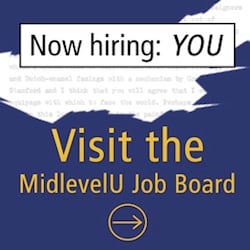How Difficult is Finding a Nurse Practitioner Job Over 50?
A reader recently asked me to address attitudes of employers toward nurse practitioners over 50. This is a topic I have frequently mulled over myself in helping NPs find jobs, particularly after seeing one recruiting firm note specifically on its website that it ‘does not work with healthcare providers with more than 20 years experience’. One would think that in the world of medicine and nursing it would seem that more is better when it comes to experience. But, it certainly seems there is a ‘sweet spot’ where NPs are most employable. What does the job market look like for nurse practitioners over 50?
Just like employers are not allowed to discriminate based on race or gender in considering applicants for open positions, age discrimination is also a no-no. But, as we all know far too well, ageing is an obvious process and not easily masked. Unless an employer specifically states you are not a candidate for the job based on your age, ageism is nearly impossible to prove. So, for nurse practitioners, age can be a consideration in the job search process.
The Nursing Numbers
Overall, the nursing workforce is, shall we call it ‘experienced’, with a quarter of nurses over 50 years old. Prior to the 2008 recession, 73,000 nurses left the workforce each year, often as a result of burnout or retirement, leaving room for younger nurses to take over. But, given the stability of the nursing profession and the country’s recent economic hardships, the rate of older RNs moving on has flat lined. As a result there are currently about 900,000 nurses over the age of 50 in the U.S.
Nurse practitioner demographics paint a similar picture. According to the American Association of Nurse Practitioners, the average age of nurse practitioners in the U.S. is 49 years. In some specialties, the average age is decidedly over 50. Psychiatric nurse practitioners, on average are 54 years of age while gerontology nurse practitioners (ironically) average 53 years of age.
Employer Attitudes Toward Seasoned Workers
The are undoubtedly advantages and disadvantages for employers when it comes to hiring older nurse practitioners. Younger applicants, for example, tend to be more tech savvy. This is important in the days of electronic medical records. For professions requiring physical exertion, such as that of nursing, younger workers may be better equip physically handle the responsibilities of the job. Older, more experienced workers on the other hand have wisdom and technical knowledge often acquired only after years of experience.
The Center for Retirement Research at Boston College took a look at attitudes toward older workers by surveying more than 400 employers. According to the survey, very few employers rated older workers as ‘less productive’ than their younger counterparts with most saying older professionals are ‘more productive’. Experience and ability to interact with customers were also cited by employers as benefits of hiring more seasoned employees. On the downside, older nurse practitioners are more expensive to employ. Experience demands higher salaries and incentives like health insurance can up the overall cost of an employment package. Overall, two-thirds of employers surveyed said an older employee prospect is neither more or less attractive than someone younger.
 Job Market Outlook for 50-Somethings
Job Market Outlook for 50-Somethings
Employer attitudes toward hiring nurse practitioners are relatively neutral according to surveys and national statistics on employment show a similar picture. The unemployment rate among workers over 55 is lower than that of their younger counterparts. Labor force participation among older employees has also been on the rise since the 1990’s. Older employees who lose or leave a job, however, do have more difficulty reentering the workforce than those less experienced. So, nurse practitioners looking to get hired rather than simply keep their current position may encounter some difficulty.
In Practice
As a nurse practitioner myself and in working with nurse practitioners looking for jobs, I do notice a bit of a stigma toward older nurses and NPs in some settings. There seems to be a belief that older nurses are ‘stuck in their ways’ or less moldable when it comes to training to do a job a certain way. While this is certainly a misconception in most cases, it can work against older nurse practitioners looking for work. This is particularly true for new grad nurse practitioners with extensive nursing experience.
Statistics and polls favor a positive employment outlook for nurse practitioners over 50. Experienced nurses and NPs have a wealth of knowledge to fall back on, a valuable asset to employers. Experience, however can’t be a nurse practitioner’s only asset in a job search. Older NPs must still skillfully market themselves to employers with well-written resumes and impressive interviews to land jobs.
How have you perceived employer attitudes toward nurse practitioners over 50?
You Might Also Like: Which Specialties Experience the Most Burnout?

